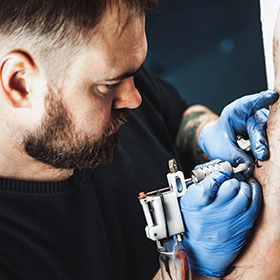Yes, baby oil can be used on tattoos. But, it depends on various factors.
Tattoos require proper care to heal and maintain their vibrant look. People often wonder if baby oil is a good option for tattoo aftercare. While baby oil is known for its gentle and moisturizing properties, its suitability for tattoos is not always clear.
Understanding the benefits and risks of using baby oil on tattoos is crucial. Some believe it helps keep the skin soft and hydrated, while others worry it might clog pores or affect the ink. In this blog, we will explore whether baby oil is a good choice for tattoo care. We will discuss its pros and cons, helping you make an informed decision for your tattoo’s health and appearance.
Introduction To Baby Oil And Tattoos
Baby oil is a smooth, clear liquid. It is made from mineral oil. It is often used on babies’ skin. It helps to keep their skin soft. Many adults use it too. It can make skin feel silky. It is easy to find in stores.
After getting a tattoo, proper care is a must. Keep the tattoo clean. Wash it with mild soap. Pat it dry gently. Do not rub. Apply a thin layer of ointment. This helps in healing. Avoid direct sunlight. Do not scratch the tattoo. Wear loose clothes. This lets the skin breathe. Follow your tattoo artist’s advice. This ensures a good healing process.
Ingredients In Baby Oil
Baby oil is mainly made of mineral oil and fragrance. Mineral oil is a clear, odorless oil. It is a byproduct of making gasoline from crude oil. This oil is refined for use in baby oil. The fragrance is added to give the oil a pleasant smell. Some baby oils may also contain vitamin E or aloe vera.
Some people may have allergic reactions to baby oil. This can cause redness, itching, or swelling. Sensitive skin types may be more prone to reactions. It is best to do a patch test first. Apply a small amount of oil on a small skin area. Wait 24 hours to see if there is any reaction. If there is no reaction, it is likely safe to use.
Baby Oil Benefits For Skin
Baby oil is a great moisturizer. It helps keep the skin soft and hydrated. Dry skin can lead to itchiness and discomfort. Using baby oil can prevent this. It locks in moisture and creates a protective layer. This layer helps keep the skin smooth.
Baby oil has soothing effects on the skin. It can reduce redness and irritation. This is especially helpful for sensitive skin. The oil can also help calm the skin after tattooing. It makes the skin feel cool and relaxed.
Tattoo Healing Process
The first days are crucial for tattoo healing. Your skin is sensitive and needs proper care. Keeping the tattoo clean is essential. Gently wash it with mild soap and water. Pat dry with a clean towel. Avoid rubbing the tattoo. Apply a thin layer of ointment recommended by your artist. This helps keep the area moist. Do not use too much ointment. It can clog the pores and cause issues.
After the initial stage, your tattoo still needs attention. Moisturizing the skin is important. Use a gentle, fragrance-free lotion. Keep the tattoo protected from the sun. UV rays can fade the colors. Wear clothing that covers the tattoo or use sunscreen. Avoid soaking the tattoo in water. No swimming or long baths until it’s fully healed.
Pros Of Using Baby Oil On Tattoos
Baby oil can make your tattoo skin soft. It keeps the skin hydrated. Dry skin can make tattoos look dull. Baby oil helps keep the skin moisturized. This keeps the tattoo bright and vibrant. Many people like the soft feel on their skin.
Baby oil is easy to apply. Just pour a little on your hand. Rub it gently over your tattoo. It spreads well and absorbs quickly. No need for complicated steps. Anyone can use it. Also, it smells nice. This makes the experience better.
Cons Of Using Baby Oil On Tattoos
Baby oil can cause skin irritations. Some people may develop rashes. It can also clog pores. This might lead to breakouts. Sensitive skin can get more irritated. Always test on a small area first.
Baby oil might dull tattoo colors. It can make the ink less vibrant. The oil may cause the tattoo to fade faster. This is because it might not fully absorb. Using baby oil can also make tattoos look shiny. This can affect the appearance of the design.
Expert Opinions
Many dermatologists believe baby oil is safe for skin. It can keep skin soft and moist. This helps in the healing process. Some say baby oil can clog pores. This might cause pimples or irritation. Use a small amount to test first. Always listen to your skin. If redness or itching occurs, stop using it.
Many tattoo artists recommend special tattoo aftercare products. These are made to help tattoos heal well. Baby oil is not often suggested. It might cause the ink to fade. Use products made for tattoos. This ensures the best healing. Always follow your artist’s advice.
Alternative Tattoo Aftercare Products
Baby oil can soothe the skin and keep it moisturized. Ideal for new tattoos needing gentle care. It’s a simple, accessible option for tattoo aftercare.
Specialized Tattoo Lotions
Tattoo lotions are made for healing tattoos. They help the skin heal well. These lotions are gentle. They do not irritate the skin. They keep the tattoo moist. This helps the ink stay bright. Using these lotions can prevent itching. It also stops the tattoo from drying out.Natural Oils
Natural oils can be good for tattoos. Coconut oil is one option. It is soothing. It keeps the skin soft. Jojoba oil is another choice. It is close to the skin’s natural oils. This makes it very gentle. Almond oil is also helpful. It has vitamins that help the skin heal. These oils are safe and natural. “`Conclusion
Baby oil can benefit tattoos when used correctly. It moisturizes and keeps skin healthy. Avoid using it on fresh tattoos. Let your tattoo heal fully first. Consult your tattoo artist for specific advice. Always choose products that suit your skin type.
Proper tattoo care ensures vibrant, long-lasting ink.

